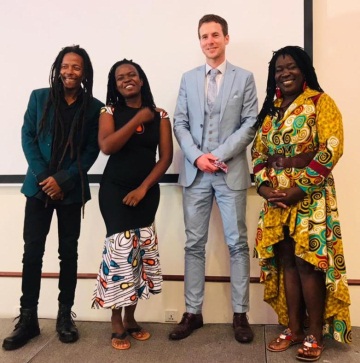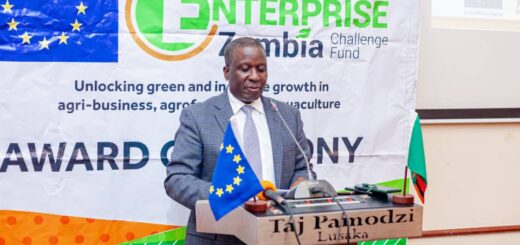Maiko Zulu seeks NAC and ZAMCOPS revamp
Notice: Undefined index: catFilterList in /home/zambi/public_html/wp-content/plugins/wp-likes/api.php on line 243

Maiko Zulu, Mwiza Zulu, British High Commissioner to Zambia & Special Rep to COMESA Nicholas Woolley and Dapusta Nkahta-Zula aka Sista D at Free Press Initiative investigative journalism event at Lusaka’s Taj Pamodzi Hotel hosted by journalist Joan Chirwa
By Derrick Sinjela
When Emmanuel Nyirenda served as Permanent Secretary at the then Ministry of Information and Broadcasting Services (MIBS), Dorcas IIunga-Chileshe and Kenneth Musamvu presided over the formation of Journalists Against Piracy in Zambia (JAPIZ), whose inaugural leaders was diplomat, Herbert Mutabi and Rosaria Lubumbashi.
This development increased coverage of intellectual property issues, with then World Intellectual Property Organisation (WIPO) Director General, Professor Mpazi Sinjela and Constable Omari Muwowo (Superintendent) taking centre stage in moulding journalists and media workers.
Quinquagenarian 50-year-old Singaporean Daren Tang Heng Shim is the fifth and current Director General of the World Intellectual Property Organization, the Geneva, Switzerland -based United Nations agency and previously served as Secretary-General of the International Union for the Protection of New Varieties of Plants.
Over the years, interest has waned to the extent that coverage of intellectual property issues is only highlighted during the annual April 26th commemoration of Intellectual Property Day (IPD) which in 2022 fall on a Tuesday themed: ‘Green Innovation- IP and Youth: Innovating for a Better Future’, building on the 2021“IP & SMEs: Taking your ideas to market,” theme.
A Partners Against Piracy Media Challenge 2021 in five (5) categories namely; Print, Online, Television, Photography and Radio – Commercial and Community open to journalists directly employed or freelancers, working for media organisations based Zambia.
The media challenge, whose duration is 30th December 2021 to Monday, 28th February, 2022, National Arts Council (NAC) Director, Mr Maanka Chipindi is excited as the media plays an important role in the fight against piracy as it can educate the public and raise awareness about the effects of piracy.
PAP is a collaborative initiative between government agencies, law enforcement agencies, distributors, content creators and rights owners that seek to inform and educate the public about the effects of piracy.
Chipindi said; “We are excited to announce the launch of the media challenge for journalists, we believe that the media plays an important role in the fight against piracy as it can educate the public and raise awareness about the effects of piracy”.
However, when reached for a comment, former Zambia Association of Musicians ((ZAM) President Maiko Somanje Zulu says initial focus must start with an overhaul of National Arts Council of Zambia (NAC) and Zambia Music Copyrights Society (ZAMCOPS) leadership.
NAC, a quasi-government agency established in 1994, began operating in 1996, was at inception chaired from 1996 to 2003 by Ambassador Mumba Kapumpa, from 2004 to 2017 by Mulenga Kapwepwe, succeeded in November 2017 by Patrick Samwimbila, while, ZAMCOPS, initially led by General Manager, late Wapolina Mkandawire was formed by Composers, Authors and Publishers of music in 1994. ZAMCOPS is registered by the office of the Registrar of Companies but is supervises by the office of the Registrar of Copyright in the Ministry of Commerce as a Collecting Society, in line with the Copyright and Performance Rights Act no. 44 of 1994.
NAC associations include the National Theatre Arts Association of Zambia (NATAAZ), National Media Arts Association (NAMA), Zambia Folk Dance and Music Society (ZAFODAMUS), Zambia Women Writers Association (ZAWWA), Zambia Popular Theatre Alliance (ZAPOTA), Zambia Association of Musicians (ZAM), Zambia Adjudicators’ Panel (ZAP), Zambia National Visual Arts Council (VAC) and the Association of Theatre for Children and Young People in Zambia (ASSITEJ).
On his part Muwowo argued: “First, ‘The maxim of law demand that “ignorance of law is not a defence.’ Secondly, it is the presumption of law that everybody knows it. It is about law and not opinion”.
Sorry reader, we had digressed historically, but listen to an advisory by Zulu: “Comrade Sinjela, Good morning, first off all, before NAC can collaborate with anyone, government to overhaul the entire National arts Council because it is not serving any purposes for any artist-artiste in this country. If you see even in the last auditor General’s report, NAC was giving empowerment funds to cadre artistes without following laid down procedures and guidelines. We have been complaining that the NAC is a divisive body instead of being uniting us. In my opinion, we need a total overhaul of NAC before it can be beneficial, even to fighting piracy and content theft. ZAMCOPS equally needs to be revamped, because institutions like Zambia National Broadcasting Corporation (ZNBC) owe billions of kwacha to musicians, just one entity, yet when you go to Zambia Music Copyrights Society at Anchor House, an artiste is given a K100 as a loyalty. When you look at logs, ZAMCOPS is not doing its job in policing people using music. So, not collecting enough, the collection base is very, very, very minimal. They are a lot of of this that need to be overhauled before these teething problems can be sorted out”.
Responding to a Sunday, 23rd January, 2022 Press Query, on how NAC and interest groups can facilitate Zambian journalists raise awareness on effects of piracy and content theft, a tart Zulu argued that restoring both National Arts Council and ZAMCOPS is imperative.
An exhibition showing the intellectual property (IP) behind Steve Jobs’ innovations opened to the public at WIPO on Friday, 30th March, 2012 and ran through to World Intellectual Property Day on Thursday, 26 April 2012 tied in with World Intellectual Property Day theme – ‘Visionary Innovators’.
History
The WIPO Member States Assembly in September 1998, the Director General of the National Algerian Institute for Industrial Property (INAPI) proposed on Wednesday 7th April, 1999, the institutionalisation of an international day for intellectual property, with the aim of: “setting up a framework for broader mobilization and awareness, [opening up] access to the promotional aspect of innovation and [recognizing] the achievements of promoters of intellectual property throughout the world”.
On Monday, 9th August, 1999, the Chinese delegation to the WIPO proposed the adoption of the “World Intellectual Property Day”: “In order to further promote the awareness of intellectual property protection, expand the influence of intellectual property protection across the world, urge countries to publicize and popularize intellectual property protection laws and regulations, enhance the public legal awareness of intellectual property rights, encourage invention-innovation activities in various countries and strengthen international exchange in the intellectual property field.
In October 1999, the General Assembly of WIPO approved the idea of declaring a particular day as a World Intellectual Property Day.
Criticism
Mike Masnick of Techdirt wrote that World Intellectual Property Day is intended “to promote ever greater protectionism and mercantilism in favor of copyright holders and patent holders, while ignoring any impact on the public of those things. It’s a fairly disgusting distortion of the claimed intent of intellectual property.”
Zak Rogoff of the Defective by Design noted that it is a “global but decidedly not grassroots event”. It has also been criticized by activists from civil society organizations such as IP Justice and the Electronic Information for Libraries who consider it one-sided propaganda as the marketing materials associated with the event, provided by WIPO, “come across as unrepresentative of other views and events”.
Michael Geist, a law professor at the University of Ottawa, noted that “World Intellectual Property Day has become little more than a lobbyist day”.
Cushla Kapitzk from the Queensland University of Technology wrote that most of the WIPO’s statements related to promotion of the World Intellectual Property Day are “either exaggerated or unsubstantiated”; noting that for example one of WIPO’s claims used to promote this event, namely that “copyright helps bring music to our ears and art, films and literature before our eyes” is “tenuous at best, and lexical association of copyright with things recognised as having social and cultural value (‘art’, ‘film’ and ‘literature’) functions to legitimate its formulation and widespread application”.
A number of grassroots-supported observances in opposition of prevalent IP laws celebrated by the World Intellectual Property Day exist, none of them supported by WIPO: Culture Freedom Day, Document Freedom Day, Hardware Freedom Day, International Day Against DRM, Public Domain Day and Software Freedom Day.
Each year, a message or theme is chosen: 2001 – Creating the Future Today, 2002 – Encouraging Creativity, 2003 – Make Intellectual Property Your Business, 2004 – Encouraging Creativity, 2005 – Think, Imagine, Create, 2006 – It Starts with an Idea, 2007 – Encouraging Creativity, 2008 – Celebrating innovation and promoting respect for intellectual property, 2009 – Green Innovation, 2010 – Innovation – Linking the World, 2011 – Designing the Future, 2012 – Visionary Innovators, 2013 – Creativity – The Next Generation, 2014 – Movies – a Global Passion, 2015 – Get Up, Stand Up. For Music, 2016 – Digital Creativity: Culture Reimagined, 2017 – Innovation – Improving Lives, 2018 – Powering Change: Women in Innovation and Creativity, 2019 – Reach for Gold: IP and Sports, 2020 – Innovate for a Green Future and 2021 – IP and SMEs: Taking Your Ideas to Market.
WIPO annually protects and commemorates Free culture, Inventors’ Day, World Book and Copyright Day.






















